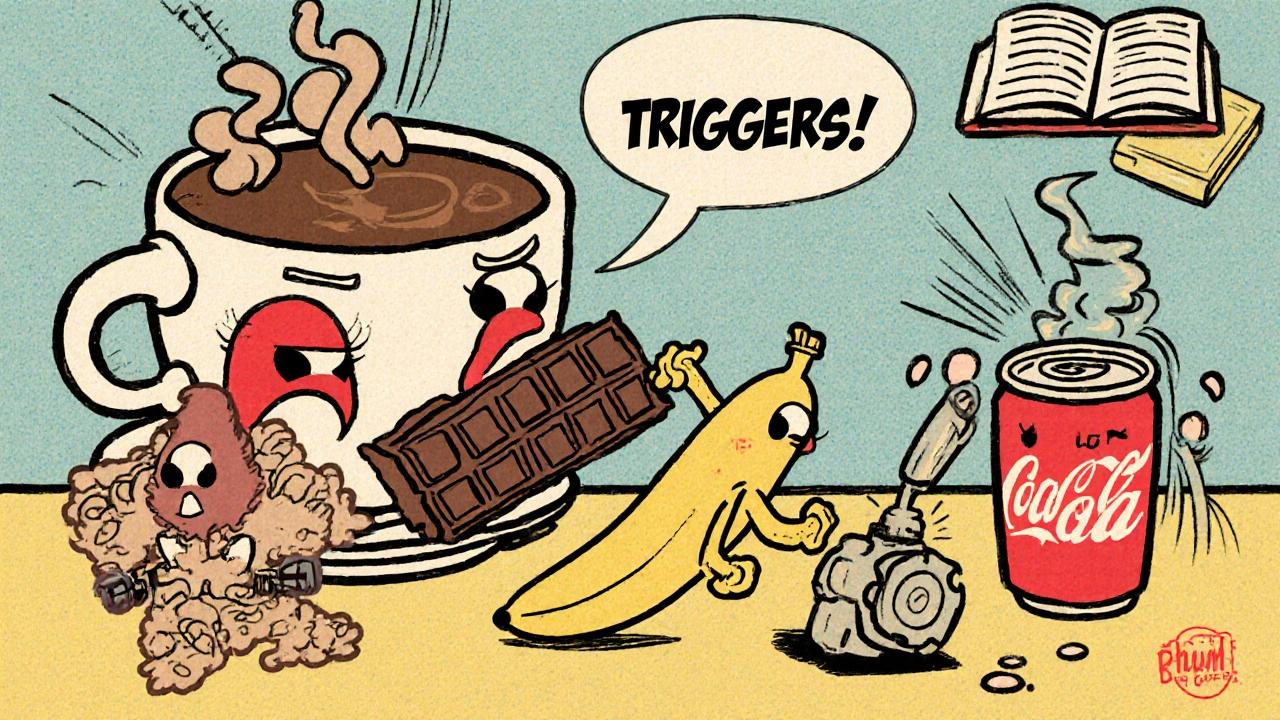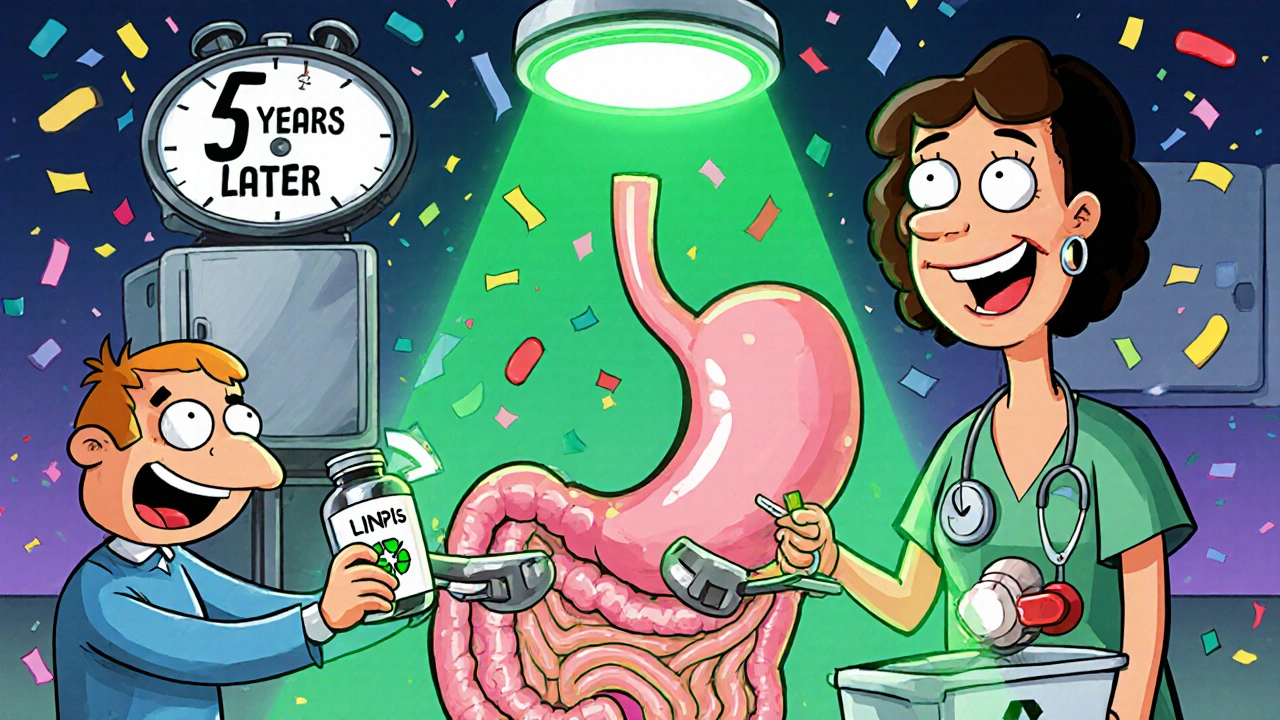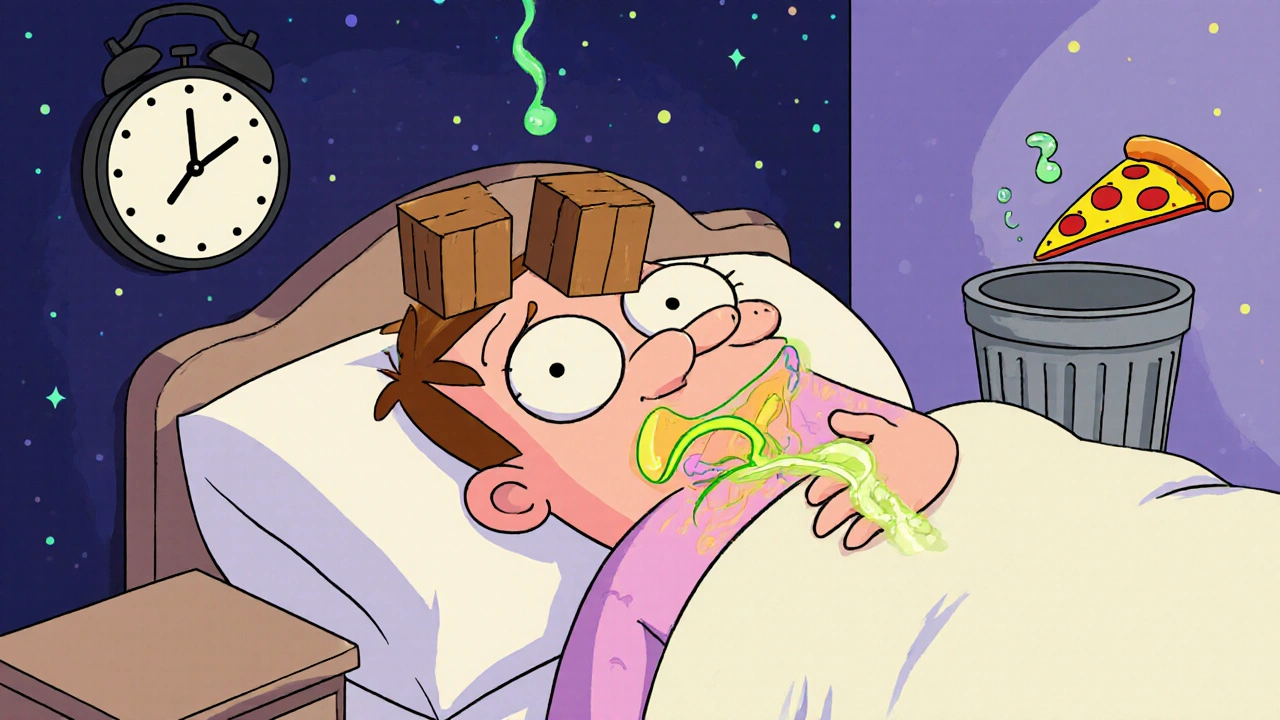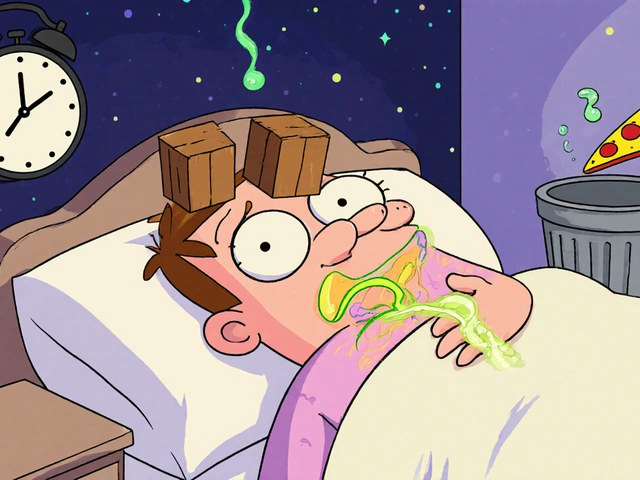What Is GERD, and Why Does It Keep Coming Back?
If you’ve ever felt that burning sensation rising from your stomach into your chest-especially after eating or lying down-you’re not alone. About 20% of people in the U.S. deal with gastroesophageal reflux disease (GERD) regularly. It’s not just heartburn. GERD means stomach acid keeps flowing back into your esophagus, often more than twice a week. Over time, this can damage the lining of your esophagus, lead to complications like Barrett’s esophagus, and even increase the risk of esophageal cancer.
Unlike occasional heartburn, GERD doesn’t go away with a single antacid. It’s a chronic condition that needs a long-term plan. And the good news? Most people can get it under control without surgery-if they know what to do.
Lifestyle Changes Are the First Step-And They Work
Before you reach for a pill, start here: your daily habits. The American College of Gastroenterology calls this Stage I of GERD management, and it’s the foundation for everything else. Simple changes can cut symptoms by half-or more.
- Elevate your head while sleeping. Use blocks or a wedge pillow to raise the head of your bed by six inches. Gravity helps keep acid where it belongs. Lying flat after eating? That’s a recipe for nighttime reflux.
- Avoid eating within three hours of bedtime. If you eat and then lie down, acid has a clear path upward. Waiting three hours gives your stomach time to empty. Studies show reflux episodes jump by 50% if you lie down within an hour of eating.
- Watch your fat intake. Meals with more than 30 grams of fat slow down digestion and relax the lower esophageal sphincter (LES). That’s the valve that’s supposed to keep acid in your stomach. High-fat meals can increase reflux by 40%.
- Quit smoking. Nicotine weakens the LES. Within 20 minutes of a cigarette, your LES pressure drops by 30-40%. Smoking also reduces saliva production, which normally helps neutralize acid.
- Lose weight if you’re overweight. Every 10% reduction in body weight leads to about a 40% drop in GERD symptoms. Belly fat puts pressure on your stomach, forcing acid upward. Even modest weight loss makes a measurable difference.
These aren’t just "nice to haves." They’re the most effective starting point-and they work better than many people realize. One Reddit user, u/HeartburnWarrior, went from daily PPI use to zero symptoms after switching to a low-fat diet and elevating their bed. No meds needed.
What Foods Trigger GERD? (And What’s Safe to Eat)
Not all triggers are the same for everyone, but some are nearly universal. Here’s what most people with GERD should avoid:
- Caffeine. Coffee, tea, energy drinks-anything with caffeine increases acid production by 23% within 30 minutes.
- Chocolate. It contains methylxanthine, which relaxes the LES by 10-15%. Even a small piece can set off symptoms.
- Peppermint and spearmint. These herbs relax the LES, making reflux more likely. Mint tea? Avoid it.
- Spicy foods. Not because they’re acidic, but because they make your esophagus more sensitive to even small amounts of acid.
- Citrus fruits and juices. Oranges, lemons, grapefruit-they’re highly acidic (pH 2.0-4.0) and can directly irritate your esophagus.
- Tomato-based products. Sauces, soups, ketchup-all have a pH around 4.0-4.6, which is low enough to trigger reflux in sensitive people.
- Carbonated drinks. Bubbles expand your stomach, increasing pressure on the LES by 15-20 mmHg. Soda, sparkling water, even beer can cause trouble.
- Alcohol. Especially red wine and spirits. Ethanol lowers LES pressure by 25%. Limit to less than two drinks per day-if you drink at all.
Instead, focus on low-acid, low-fat, non-spicy foods: oatmeal, bananas, melons, chicken breast, steamed veggies, ginger tea, and whole grains. Keep a food diary for two weeks. Write down what you eat and when symptoms hit. Most people find 2-3 specific triggers that they can eliminate to see big improvements.

Medications: From Antacids to the Latest Breakthroughs
If lifestyle changes aren’t enough, medications step in. There’s a clear progression, based on symptom severity.
Stage II: Antacids and H2 Blockers
Antacids like Tums (calcium carbonate) give fast relief by neutralizing acid-but only for 30-60 minutes. They’re great for occasional heartburn, not daily GERD.
H2 blockers like famotidine (Pepcid) reduce acid production by 60-70%. They kick in within an hour and last 10-12 hours. Good for nighttime symptoms or after a trigger meal.
Stage III: Proton Pump Inhibitors (PPIs)
These are the go-to for moderate to severe GERD. PPIs like omeprazole (Prilosec), esomeprazole (Nexium), and pantoprazole (Protonix) cut acid production by 90-98%. They work best when taken 30-60 minutes before your first meal of the day-timing matters. Many people take them at night, which reduces effectiveness by 40%.
PPIs heal erosive esophagitis in 80-90% of people within 8 weeks. But they’re not harmless. Long-term use (over a year) is linked to higher risks of pneumonia, C. diff infection, kidney disease, and low magnesium or B12 levels. The FDA updated warnings in 2022 and 2024 about these risks.
Stage IV: The New Kid on the Block-P-CABs
In December 2023, the FDA approved vonoprazan (Voquezna), the first potassium-competitive acid blocker (P-CAB). Unlike PPIs, which need days to build up, vonoprazan works fast-within hours-and keeps acid suppressed for longer. In trials, 95% of patients maintained a stomach pH above 4 for a full 24 hours, compared to just 65% on PPIs. It’s especially helpful for people who still have nighttime reflux on PPIs.
By mid-2024, over 120,000 new prescriptions were written for vonoprazan. It’s not a magic bullet, but for those who’ve tried everything else, it’s a game-changer.
Surgery: When Medications Aren’t Enough
About 10-15% of people with GERD don’t respond to meds or want to get off them long-term. That’s where surgery comes in.
Laparoscopic Nissen Fundoplication
This is the gold standard. The surgeon wraps the top of the stomach around the lower esophagus to reinforce the LES. Success rate? 90-95% at five years. But 5-10% of people develop trouble swallowing, and 15-20% get gas-bloat syndrome-feeling full, bloated, and unable to burp.
LINX Reflux Management System
Approved in 2012 and updated in 2020, LINX is a small bracelet of magnetic titanium beads placed around the LES. It lets food pass through normally but snaps shut to block acid. Studies show 85% of patients stay off daily PPIs after five years. Side effects? Only 2-3% need reoperation. But you can’t have an MRI after this implant.
Transoral Incisionless Fundoplication (TIF)
This newer procedure uses an endoscope to stitch the stomach into a new shape-no incisions. Success rate is 70-75% at three years. But it’s not widely available. As of January 2025, only 127 providers in the U.S. are certified to do it.
One Reddit user, u/AcidRefluxSufferer, tried PPIs for five years until they stopped working. Then they got LINX. Two years later? No symptoms, no meds. Others report ongoing bloating or swallowing issues. Surgery isn’t risk-free-but for the right person, it’s life-changing.

What Experts Are Saying Now
Doctors no longer treat all GERD the same. The American College of Gastroenterology’s 2022 guidelines stress personalization. Some people have erosive esophagitis-visible damage. Others have non-erosive reflux disease (NERD), where the esophagus looks fine but still hurts. For NERD, acid blockers may not be enough. Visceral hypersensitivity-where nerves in the esophagus are overly sensitive-might be the real culprit.
Dr. Michael Vaezi from Vanderbilt says, "We now know that 30-40% of patients have NERD. We need to tailor treatment beyond just reducing acid."
Meanwhile, Dr. Lauren Gerson from Stanford argues for earlier surgery in patients with confirmed pathologic acid exposure. Her research shows 85% of surgical patients stay symptom-free at 10 years, compared to just 45% on long-term meds.
The message? There’s no one-size-fits-all. Your plan should match your symptoms, your body, and your goals.
What to Do Next: A Simple Action Plan
Here’s how to start today:
- Track your triggers. Keep a food and symptom diary for 14 days. Note meals, timing, and symptoms.
- Make two lifestyle changes. Elevate your head while sleeping. Stop eating 3 hours before bed.
- Eliminate the top three triggers. Cut out caffeine, chocolate, and carbonated drinks for two weeks.
- See your doctor. If symptoms persist, ask about PPIs. If you’re on them long-term, ask about magnesium and B12 levels.
- Ask about alternatives. If PPIs aren’t working or you’re tired of them, ask about vonoprazan or whether you’re a candidate for LINX.
GERD doesn’t have to control your life. With the right mix of diet, habits, and medication-or even surgery-you can eat without fear, sleep without pain, and live without daily pills.
Frequently Asked Questions
Can GERD be cured permanently?
GERD is a chronic condition, but it can be managed effectively. For many, lifestyle changes and medication bring symptoms under control. Some people achieve long-term relief with surgery like LINX or fundoplication-especially if they have documented acid reflux and respond well to PPIs. While it may not be "cured" in the traditional sense, most people can live symptom-free without daily medication.
Are PPIs safe to take for years?
Long-term PPI use (over a year) is linked to increased risks of pneumonia, Clostridium difficile infection, chronic kidney disease, and low levels of magnesium and vitamin B12. The FDA recommends monitoring blood levels every 6 months if you’re on PPIs long-term. Don’t stop abruptly-talk to your doctor about tapering. For many, switching to an H2 blocker or P-CAB like vonoprazan can reduce long-term risks.
Does stress make GERD worse?
Stress doesn’t cause GERD, but it can make symptoms feel worse. It increases stomach acid production and makes your esophagus more sensitive. Techniques like diaphragmatic breathing-15 minutes after meals-can reduce symptoms by 35%. While not a cure, managing stress helps you stay in control.
Can I drink alcohol with GERD?
Alcohol relaxes the lower esophageal sphincter and increases acid production. Even small amounts can trigger reflux. If you drink, limit to less than two standard drinks per day. Red wine and spirits are worse than beer. Many people find they feel better after cutting out alcohol completely-even if they don’t think it’s a trigger.
Is LINX surgery worth it?
For people who want to stop daily PPIs and have confirmed acid reflux, LINX is highly effective. Eighty-five percent of patients stay off PPIs after five years. Common side effects include trouble swallowing large pills or gas-bloat. It’s not for everyone-especially if you’ve had prior stomach surgery or need future MRIs. But for the right candidate, it offers freedom from medication and lasting relief.
What’s the difference between GERD and acid reflux?
Acid reflux is a common symptom-everyone gets it now and then. GERD is the chronic condition diagnosed when reflux happens more than twice a week, causes esophageal damage, or requires ongoing treatment. Think of it this way: acid reflux is a single episode. GERD is the disease behind those episodes.
Can I stop taking PPIs cold turkey?
No. Stopping PPIs suddenly can cause rebound acid hypersecretion-your stomach overproduces acid for weeks, making symptoms worse than before. Always work with your doctor to taper off slowly, often switching to an H2 blocker first. This prevents a rebound flare.
Do I need an endoscopy for GERD?
Not always. If your symptoms are typical and respond to PPIs, you may not need one. But if you have warning signs-trouble swallowing, unexplained weight loss, vomiting blood, or anemia-an endoscopy is essential to check for Barrett’s esophagus or other complications. Guidelines recommend endoscopy for patients over 50 with long-standing symptoms.



Nosipho Mbambo
November 19, 2025 AT 05:40King Over
November 19, 2025 AT 09:13Ravinder Singh
November 21, 2025 AT 04:56Destiny Annamaria
November 21, 2025 AT 08:06daniel lopez
November 22, 2025 AT 02:09Katie Magnus
November 22, 2025 AT 19:25Russ Bergeman
November 22, 2025 AT 23:03Dana Oralkhan
November 24, 2025 AT 16:22Jeremy Samuel
November 25, 2025 AT 03:49Ron and Gill Day
November 25, 2025 AT 19:24Johannah Lavin
November 26, 2025 AT 03:23